A busy conference schedule commenced for CSU’s Department of Construction Management for Spring 2020. Prior to the COVID-19 pandemic affecting travel, several conferences in the first quarter were attended by CM faculty and graduate students, with research being presented, posters shared, and great networking between educators and industry members.
Transportation Research Board Annual Meeting, Washington, D.C., January 12-16.
With 13,000 attendees from all over the globe, the TRB annual meeting program covered all transportation modes, with more than 5,000 presentations in nearly 800 sessions and workshops. Topics of interest were addressed for policy makers, administrators, practitioners, researchers, and representatives of government, industry, and academic institutions. It is the largest venue for transportation research dissemination and service in the U.S.
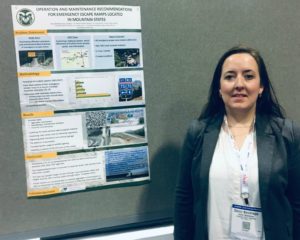
The conference offered multiple workshops to understand the current state of transportation infrastructure, along with several innovative ideas implemented by state departments of transportation (DOTs) addressing further developments in this area. These ideas included interactive BIM maturity models, development of data management plans, data driven processes for quality assurance and quality control, BIM coordination, and drone usage for accurate inspections. Several state DOTs provided great examples of such technological developments being adopted in their projects. Presentation panels and poster sessions were scheduled for three days, offering innovation in research that was incredible.
Deniz Besiktepe, a Ph.D. student in Construction Engineering and Management, presented a poster entitled, “Operation and Maintenance Recommendations for Emergency Escape Ramps Located in Mountain States.” Besiktepe’s presented study is part of a research project jointly conducted at Colorado State University by the Department of Construction Management and the Colorado Department of Transportation (CDOT). See here for more information on her presentation at TRB.
American Society of Civil Engineers Construction Institute Summit, Los Angeles, CA, February 20-22.
This summit brings together construction industry members, academics, and legal professionals to discuss construction industry challenges. The Construction Institute also hosts a workshop on Legal Affairs and Dispute Resolution (LADR) in conjunction with the summit. Authors with approved articles in the Journal of Legal Affairs and Dispute Resolution in Engineering and Construction were selected to present their work.
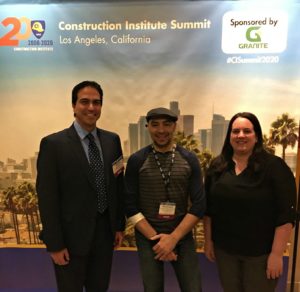
CM faculty presented “Mock Arbitration as Experiential Legal Education for Construction Management Students,” co-authored by Erin Arneson and Mehmet Ozbek. This paper offers discourse on construction management (CM) students preparing for a career in the U.S. construction industry requiring knowledge of legal concepts and construction contract law. This study examines the use of an experiential legal education strategy, the mock arbitration, within the CM Department curriculum at Colorado State University.
Students in the CON 367 – Construction Contracts and Project Administration course used historical construction claim documents to participate in mock arbitration legal simulations while representing the owner, contractor, or arbitration panel member. Results indicate the mock arbitration contributed the most to student understanding of the importance of documentation in the claims process. Additionally, increases in student legal knowledge vary significantly based on student representation (e.g., Owner, Contractor, or Arbitration Panel) during the mock exercise.
Campus, Safety, Health, and Environmental Management Association (CSHEMA) Symposium on Safety Culture, Dallas, Texas, February 27-28.
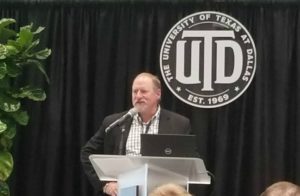
This conference, held at the University of Texas, Dallas, was attended by approximately 120 safety leaders and administrators from across the country in higher education. The attendees are primarily responsible for the safety program implementation at their respective universities. Topics of discussion centered on how to create and build strong safety cultures in a campus environment.
CM instructor, Chad Olivier, who teaches the Safety Management course, presented on “Leadership Strategies to Drive and Influence Positive Safety Culture.” Olivier explains, “It must start with leadership, and the attitudes and values of the organization that influence the priorities and fundamentals that will work to ensure that everyone goes home at night the way they came to work.
An exploration of human appetites and tolerances for risk taking is essential in getting students to appreciate how difficult it can be to break individuals from bad habits or behaviors that may one day result in serious injury or death. A strong and effective safety culture cannot be defined as much as it can be felt. It feels different in the ways people embrace the requirements as valuable to both themselves and their organization.”
14th Annual International Technology, Education and Development Conference (INTED), Valencia, Spain, March 2-4.
INTED is one of the largest international education conferences for faculty, researchers, technologists, and professionals from the educational sector. After 14 years, it has become a reference event where experts from various countries get together to present their projects and share their knowledge of teaching and learning methodologies and innovations on educational technology.
The conference welcomed nearly 600 participants from more than 65 different countries. INTED is more than a conference, it is an ideal platform for international strategic networking and a venue to present innovations and projects related to education and technology.
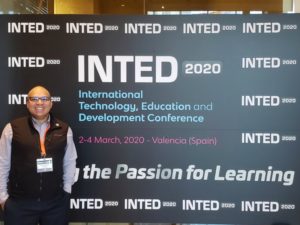
This year, CM was represented by Associate Professor Rodolfo Valdes-Vasquez through the presentation of a paper, “Understanding the Learning Impacts of a Short-Term Study Abroad by Using a Mixed-Method Approach,” by Rodolfo Valdes-Vasquez India Luxton, and Mehmet Ozbek. The paper focuses on the preliminary learning outcomes of a short-term study abroad. The mixed-method approach was chosen to capture the network structure of the class as well as provide a deeper understanding of the story of the network. Engaging with local community members and understanding their needs was seen to be a key aspect of student learning. In addition, incorporating local students in the course strengthened peer-to-peer learning.
Precast/Prestressed Concrete Institute (PCI) Convention 2020, Fort Worth, TX, March 4-7.
PCI is one of the United States’ premier organizations in the precast industry. The PCI convention offers a perfect platform to meet leading precast companies, vendors and sustainability experts from around the world.
The PCI foundation hosted a national-level competition, Project Precast 2020. CM graduate student, Tanmay Vasishta, was selected by the sponsors to represent Colorado State University, since his thesis pertained to precast buildings.
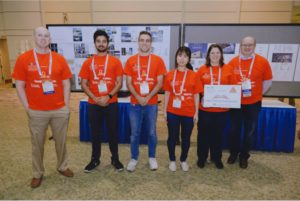
The second day competition required all teams to put together a proposal for a state-of-the-art high school football stadium made with total precast. As a construction manager on the team, Vasishta was able to apply the knowledge gained from past experience and precast bootcamp to help out his teammates.
Additionally, he had the opportunity to meet several industry people at the precast exhibition and learn about the design, engineering, sustainability and installation strategies in the field of precast. Vasishta said, “The whole point of research is to help the precast industry practitioners in promoting sustainable construction, and thus it is always beneficial to know if the research makes sense to the industry stakeholders.”
Construction Research Congress (CRC) Conference in Tempe, AZ at Arizona State University, March 8-10.
The purpose of the CRC conference is for construction academics, graduate students, and industry to come together to present research and to develop connections for collaboration on research and education for the construction industry. CRC is a conference supported by the Construction Institute (CI) of the American Society of Civil Engineers (ASCE). CRC is a construction organization that promotes the advancement of the construction industry through education and research.
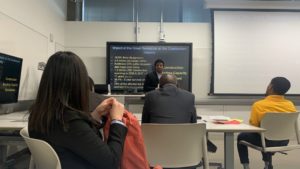
The paper presented entitled, “Evaluation of Construction Surety Bonding Criterion for Changing Economic Conditions,” was co-authored by Manideep Tummalapudi, a doctoral student from Colorado State University’s Department of Construction Management, and CM Assistant Professor, John Killingsworth. Tummalapudi presented the paper that reflects changing economic conditions, which have created uncertainty in the construction industry. Developers, construction companies, and sureties are all sensitive to the potentiality of failure and subsequently the need to manage financial risk. Understanding the changing nature of bonding requirements helps construction companies prepare financial risk management strategies for varying economic conditions.
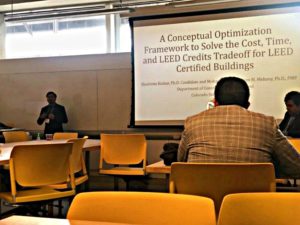
Another graduate student from the Construction Engineering and Management doctoral program, Shantanu Kumar, attended CRC and had the opportunity to present two different research articles, co-authored with Mohammed Mehany, CM Assistant Professor. The first paper, “An Integrated Approach towards Measuring and Comparing Cities’ Socio-Economic Resilience,” looked at recent decades and how natural disasters and financial crisis have been the catalyst to the conception of sustainable development and resiliency fundamentals to help cities become more resilient to natural disasters and economic turmoil.
Kumar’s second paper, “A Conceptual Optimization Framework to Solve the Cost, LEED Credits and Time Tradeoff for LEED Certified Buildings,” discusses previous tradeoffs in the construction industry and classifies the tradeoff between time, cost, and sustainability as a multi-objective optimization problem. An optimization model is constructed with test values as the test data for the model. These optimal values change when the user-defined RIF is changed, hence making the model user-friendly and flexible to use.
The Department of Construction Management is part of CSU’s College of Health and Human Sciences.